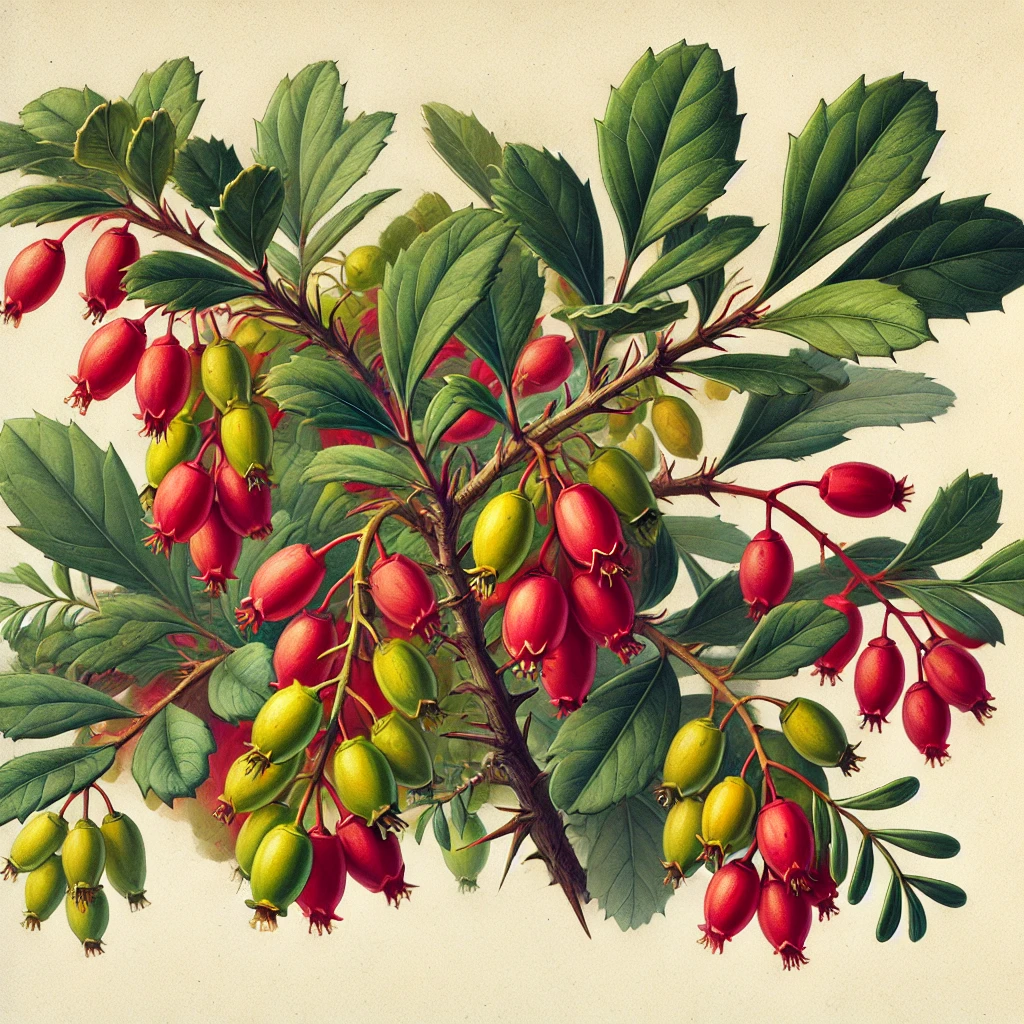Barberry (Berberis vulgaris): A Potent Herbal Remedy for Digestive, Cardiovascular, and Immune Support

Overview
Barberry, known scientifically as Berberis vulgaris, is a thorny shrub with bright red berries and medicinal bark and roots. Barberry has been used for centuries in herbal medicine, primarily for digestive health, liver function, and immune support. The active compound berberine, found in the root and bark, has strong antibacterial, anti-inflammatory, and antispasmodic properties. While barberry berries are generally safe, other parts of the plant require cautious use due to potential side effects from berberine, especially in large doses.
Medicinal Activity
Barberry offers a wide range of medicinal activities, including:
Antibacterial and Antiseptic: Effective against a variety of bacteria, making it useful for infections.
Anti-inflammatory: Reduces inflammation, which is beneficial for conditions like arthritis.
Antipyretic: Helps lower fever, often used in infections.
Cholagogue and Choleretic: Stimulates bile flow, supporting liver and gallbladder health.
Diuretic: Promotes urination, aiding in detoxification and reducing water retention.
Laxative: Gently supports bowel movement, helpful for mild constipation.
Immunostimulant: Enhances immune function, supporting general health.
Antibacterial and Antiseptic: Effective against a variety of bacteria, making it useful for infections.
Anti-inflammatory: Reduces inflammation, which is beneficial for conditions like arthritis.
Antipyretic: Helps lower fever, often used in infections.
Cholagogue and Choleretic: Stimulates bile flow, supporting liver and gallbladder health.
Diuretic: Promotes urination, aiding in detoxification and reducing water retention.
Laxative: Gently supports bowel movement, helpful for mild constipation.
Immunostimulant: Enhances immune function, supporting general health.
Therapeutic Indication
Barberry is traditionally used to address a wide range of health conditions, including:
Digestive Health: Alleviates symptoms of dyspepsia, diarrhea, and constipation, promoting gastrointestinal function.
Liver and Gallbladder Support: Useful for jaundice, gallstones, and other liver-related issues due to its bile-stimulating effects.
Cardiovascular Health: Assists in lowering blood pressure and may help in managing certain arrhythmias.
Skin Conditions: Used externally to treat skin issues like eczema and acne due to its antibacterial properties.
Immune and Respiratory Health: Supports immunity and may aid in respiratory conditions, including colds and bronchitis.
Digestive Health: Alleviates symptoms of dyspepsia, diarrhea, and constipation, promoting gastrointestinal function.
Liver and Gallbladder Support: Useful for jaundice, gallstones, and other liver-related issues due to its bile-stimulating effects.
Cardiovascular Health: Assists in lowering blood pressure and may help in managing certain arrhythmias.
Skin Conditions: Used externally to treat skin issues like eczema and acne due to its antibacterial properties.
Immune and Respiratory Health: Supports immunity and may aid in respiratory conditions, including colds and bronchitis.
Prepration & Usage
Barberry can be prepared in various forms, but dosage should be carefully managed due to potential side effects:
Tincture:
Dosage: 1.5–3 tsp of tincture taken up to three times daily for digestive and immune support.
Tea/Infusion:
Ingredients: 1–2 tsp of barberry root bark or berries in hot water.
Instructions: Steep for 10–15 minutes. Drink once or twice daily, primarily for digestive and immune support.
Topical Use:
Application: Barberry can be applied as a compress or wash for skin infections or sores.
Tincture:
Dosage: 1.5–3 tsp of tincture taken up to three times daily for digestive and immune support.
Tea/Infusion:
Ingredients: 1–2 tsp of barberry root bark or berries in hot water.
Instructions: Steep for 10–15 minutes. Drink once or twice daily, primarily for digestive and immune support.
Topical Use:
Application: Barberry can be applied as a compress or wash for skin infections or sores.
Safety & Considerations
While barberry is effective, it requires cautious use:
Pregnancy: Not recommended during pregnancy due to uterine stimulant effects.
High Dosages: Large doses of berberine can cause dizziness, respiratory issues, and severe drops in blood pressure.
Long-Term Use: Extended use is not advised without medical supervision, as berberine may accumulate in the system and cause side effects.
Pregnancy: Not recommended during pregnancy due to uterine stimulant effects.
High Dosages: Large doses of berberine can cause dizziness, respiratory issues, and severe drops in blood pressure.
Long-Term Use: Extended use is not advised without medical supervision, as berberine may accumulate in the system and cause side effects.
Conclusion
Barberry is a potent herbal remedy with benefits for digestion, immune health, and cardiovascular support. Its wide range of applications makes it a valuable addition to herbal medicine, but it must be used with care, particularly in large doses or over extended periods. Barberry’s medicinal potential remains highly regarded, offering support across various health areas with appropriate use.
